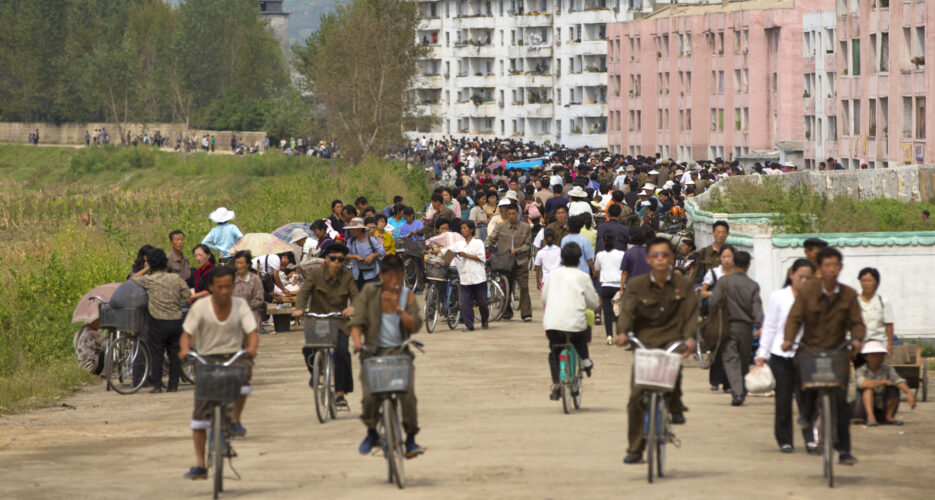Book review: Do North Korea’s markets undercut Kim Jong Un or prop up his rule?
Andrew Yeo’s new book explores how capitalist activity can subvert state power while failing to bring fundamental change
David Tizzard June 20, 2022

SHARE
A crowded North Korean market in the suburbs of Hamhung, South Hamgyong province | Image: Eric Lafforgue (Sept. 11, 2012)
Andrew Yeo’s “State, Society, and Markets in North Korea” asks an important question: How much is the rise of both formal and informal markets in North Korea changing the country’s politics and society? Do networks of black markets, the existence of a new moneyed class (“donju”) and grassroots capitalism contradict the country’s official juche ideology and thus point to weakening belief in the regime?
Two prevailing trains of thought exist. One suggests that these nascent markets will engender greater individual responsibility and the birth of civil society, subsequently leading to a decline of state authority. The other argues that any markets in North Korea operate within the framework of the existing ideology and will therefore strengthen rather than challenge the regime’s hold over its people.
Yeo, a professor of politics at Catholic University of America and Korea Chair at The Brookings Institution, is hesitant to suggest which of these best describes the future of North Korea. But he instead lays out the arguments for both sides with clear and accessible language in his short book, a contribution to the Cambridge Elements series.
LOOKING TO BEIJING FOR CLUES
Much like Katie Stallard, whose book NK News reviewed last month, Yeo positions North Korea not as a unique political entity but as an authoritarian state with similarities to others found around the world.
In this view, North Korea is different in degree rather than kind from China and Vietnam. Commonalities can be observed among such states through their focus on two goals: preventing citizen uprisings and keeping the nation’s elites satisfied yet controlled.
And it’s in looking toward Beijing that Yeo sees some hope for change in North Korea. By citing studies on the transformation of Chinese economic and political structures, as well as data from Pyongyang suggesting that informal private markets now heavily outstrip the dated and ineffective public distribution system (PDS), Yeo argues that a kind of attitude shift was indeed taking place prior to the COVID-19 pandemic and subsequent economic restrictions.
“North Korea, or at least a certain segment of an ‘enlightened’ population, appeared to be moving along this path of social awakening,” he writes.
Yeo adds, however, that North Korea’s transformation is not entirely an internal affair. “Whether marketization can proceed remains contingent on North Korea’s relationships with external actors,” he writes, most notably the U.S. and China.
While Washington wants a denuclearized Pyongyang and Beijing a more stable Northeast Asia region, Kim will find it hard to deliver either of these under current economic and security constraints.
Moreover, as Yeo points out, the young North Korean leader is not living up to the image of a European-educated liberal reformer many analysts had hoped and suggested he might. Instead, he is modeling himself on his grandfather Kim Il Sung and clamping down on a range of “undesirable” behavior.A streetside food vendor in Pyongyang | Image: Eric Lafforgue (May 10, 2010)
SUBVERSION, SATIRE AND SURVIVAL
Yeo also addresses whether the irrefutable evidence of markets and a decreasing reliance on the state points to criticisms or disappointment with Kim’s governance or the North Korean state more broadly.
On the one hand, private markets and capitalist behavior can be understood as ideological insubordination and a form of active resistance. Not only counter to state doctrine, local markets are also politicized in terms of language and attitudes; Yeo points out that they “have become sites of ‘malbandong’ (revolution by mouth)” at which official state rhetoric is subject to subversive interpretations, satire and even ridicule.
And yet, Yeo concludes there has not been any noticeable weakening of state control, nor has there been the emergence of civil society. Local markets are about survival and daily life, Yeo writes, their existence “testament to [citizens’] resourcefulness and entrepreneurialism.” Rather than a causal link to a future revolution or uprising, they exist in the framework of an authoritarian system and don’t necessarily indicate an undermining of that structure.
Perhaps the greatest strength of this work is the comprehensive view it provides of the contemporary literature on North Korea. Most of the references and ideas gathered here are from the last couple of years, and readers are provided with Yeo’s understanding of many other respected thinkers and their current contributions and perspectives on North Korea.
It’s also welcome to see the frequent use of local North Korean terms when talking about the various phenomena that Yeo describes. Not only does this provide a sense of authenticity, it also provides Korean speakers better insight into how the ideas and behavior in North Korea might be understood and used by the people there.
At just over 60 pages in length, it is difficult to call “State, Society, and Markets in North Korea” a book. It might be more appropriate to think of it as an extended essay. It is also worth noting that some of the pages are dedicated to theoretical reviews of civil society and authoritarianism, including analysis of Jürgen Habermas and Hannah Arendt.
If you are a more casual reader, you might not enjoy some of the theoretical analysis. If you are a student, you might hesitate to pay for something so short. Nevertheless, Andrew Yeo’s work is a thoroughly enjoyable read that can be recommended to anyone looking to understand North Korea’s markets and (continued absence of) civil society.
Edited by Thomas Maresca

David Tizzard
David A. Tizzard (@Hesp365) has a Ph.D. in Korean Studies and lectures at Seoul Women's University and Hanyang University. He is a social and cultural commentator who has lived in Korea for nearly two decades. He is also the host of the Korea Deconstructed podcast.
No comments:
Post a Comment